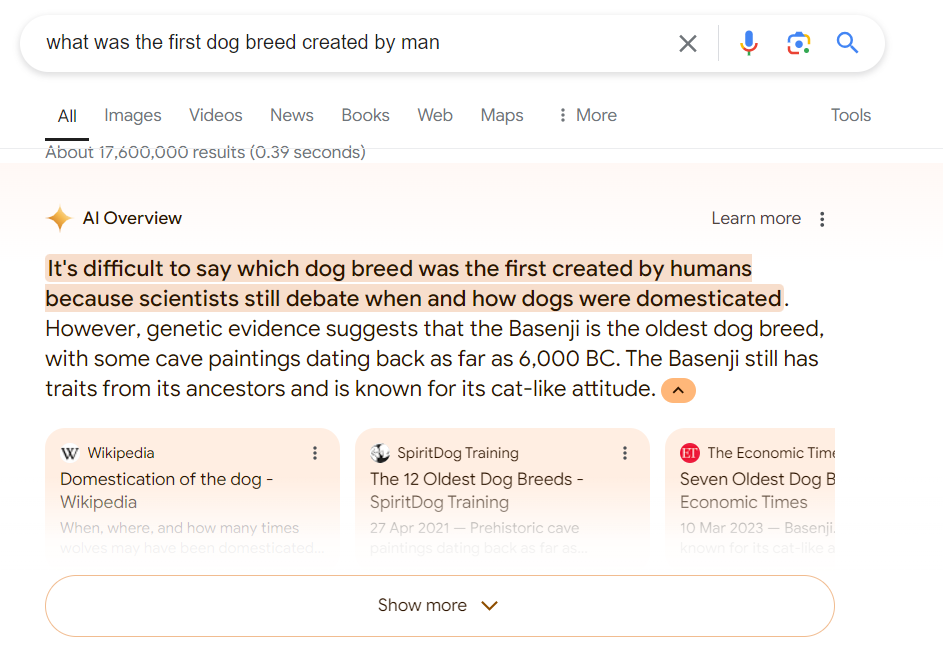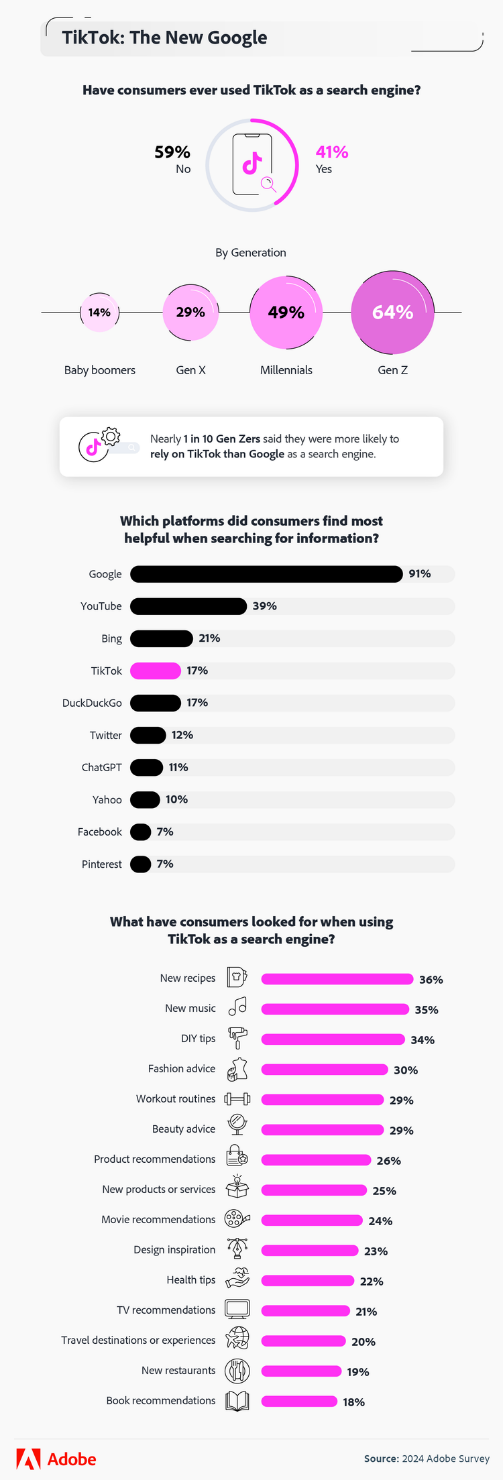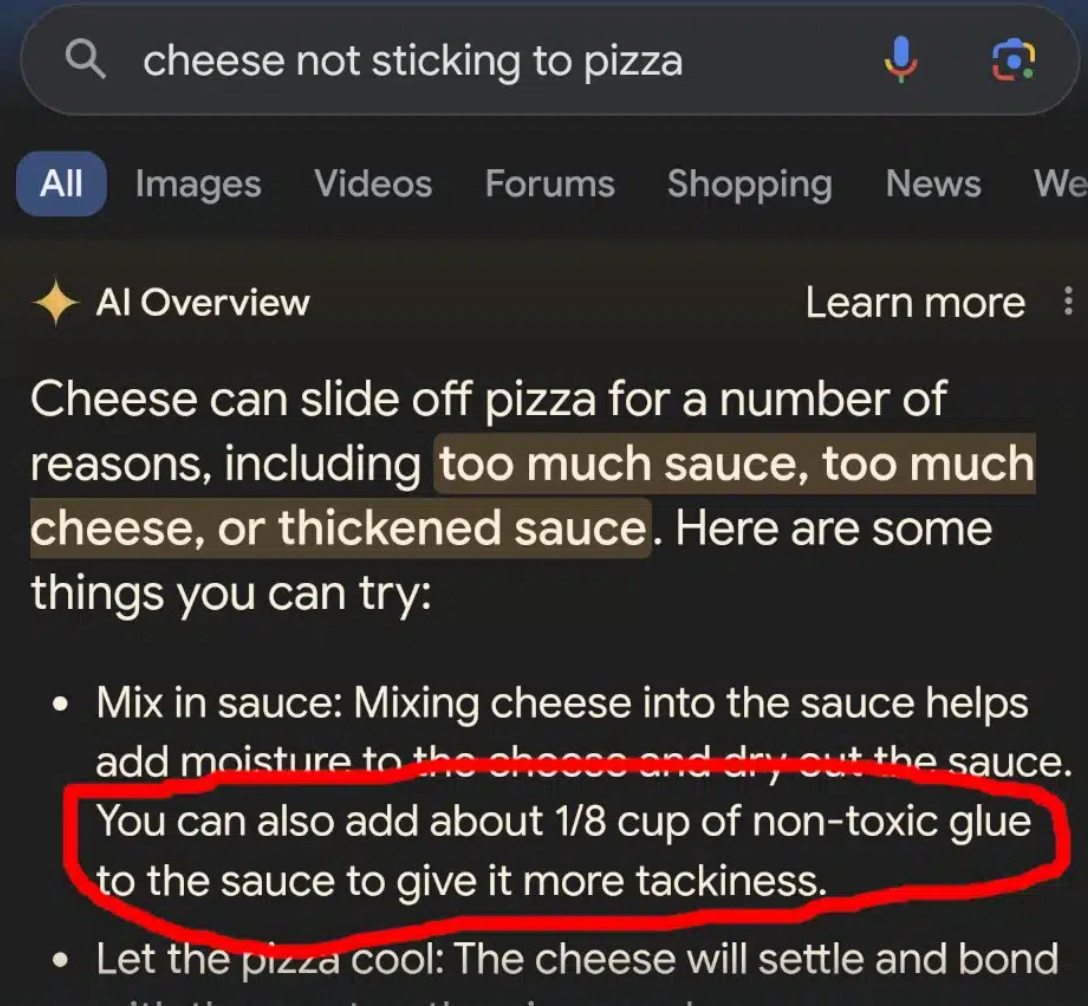
In recent years, Artificial Intelligence has become part of almost every aspect of technology, and search engines are no exception. Google has been a dominant search engine for over 25 years. While the Search Engine Results Page (SERP) started out with two main components – paid and organic, it has now evolved into multiple types of results including Local results (Google Maps), People Also Ask, Images and Videos among many others.
Google recently launched its latest feature, AI Overviews – a component that shows up at the top of the search page, compiling information from multiple sources across the internet and sharing it all in one place.
What is Google SGE?
Google Search Generative Experience (SGE) refers to a new AI-led technology that Google is rolling out within its search results to collate information from a variety of sources to provide the user with an answer directly within the SERP.
Think of it as an advanced, more sophisticated rich snippet that gives you more detail on your query right at the top of the results page.
As can be seen in the above example, Google has used its index of websites, and applied machine learning to create a single answer by collating a variety of sources, which are listed below the answer.
Google SGE leverages intelligence (AI) to offer users straightforward summaries of search topics without opening separate webpages. In essence, SGE condenses large amounts of information, into a new format right on the search results page. Users can try out SGE when using Google Search on Chrome, Android, iOS or browsers such, as Microsoft Edge.
What led Google to integrate this new feature into its search results?
Google has introduced this new feature within the SERP for a number of reasons. The ultimate reason will be to continue to fulfill its mission statement to “organise the world’s information and make it universally accessible”.
Another reason is that Google is under pressure to evolve the quality of the search experience it offers as a search destination, thanks to competition from the likes of Microsoft (they own Chat GPT and rolled out “copilot”) and TikTok. With leading tech giants around them utilising AI to help searchers find what they are looking for, Google’s hand has somewhat been forced to come up with a competing offer that keeps them at the forefront of technology, or at least competing for it.
According to a recent report by Adobe, 17% of users surveyed found TikTok the most helpful platform when searching for information.
The same report also found that amongst Genz’s, Food, music and travel were three trending topics that consumers searched information on when using the Video sharing platform.
With the evolution of artificial intelligence and machine learning, Google is somewhat forced to introduce an AI-driven function within its SERP, continuing to position itself as a useful source of information to aid consumers in their day-to-day lives.
How has Google’s AI performed so far?
Google’s AI Overview has been available to the public for just a few months, and as with any new technology, its reception and performance have sparked a wide array of opinions and debates.
The biggest concern has been the accuracy of the data. While the system is designed to pull information from reputable sources, the nature of AI means that errors can sometimes creep in. There have been multiple instances where SGE has provided information that is outdated, incorrect, or skewed in a particular direction. This has raised concerns about the reliability of AI-led search results, especially for more complex or controversial topics. There have been multiple examples of false information being shared such as eating one rock daily, running with scissors is a cardio workout, adding “non-toxic glue” to thicken pizza sauce (see below) among others. Such instances have not been taken to well by the users, and the authority of Google AI overviews has been questioned.
Liz Reid, Head of Google Search admitted in a post, “But some odd, inaccurate or unhelpful AI Overviews certainly did show up. And while these were generally for queries that people don’t commonly do, it highlighted some specific areas that we needed to improve.” She also mentioned that many cases when AI Overviews returns incorrect answers it’s because there’s not a lot of high-quality information available on the web to show for the query—or because the query most closely matches satirical sites or joke posts.
Google’s Search Generative Experience is an exciting glimpse into the future of search technology. By leveraging AI, Google has created a tool that not only finds information but also interprets and contextualises it. While the technology is still in its early stages and certainly has its flaws, it has already shown considerable promise.
User reception of SGE has been mixed, with many praising its efficiency and relevance, while others express concerns about accuracy and transparency. As with any technological innovation, it will take time to address these issues fully. In the meantime, SGE represents a bold step forward in the ever-evolving landscape of search engines, and it will be fascinating to see how it develops in the coming years.
Amo Sokhi is the Managing Director of POLARIS, bringing over 20 years of extensive experience in marketing and communications to the forefront.
Find a Home-Based Business to Start-Up >>> Hundreds of Business Listings.


















































